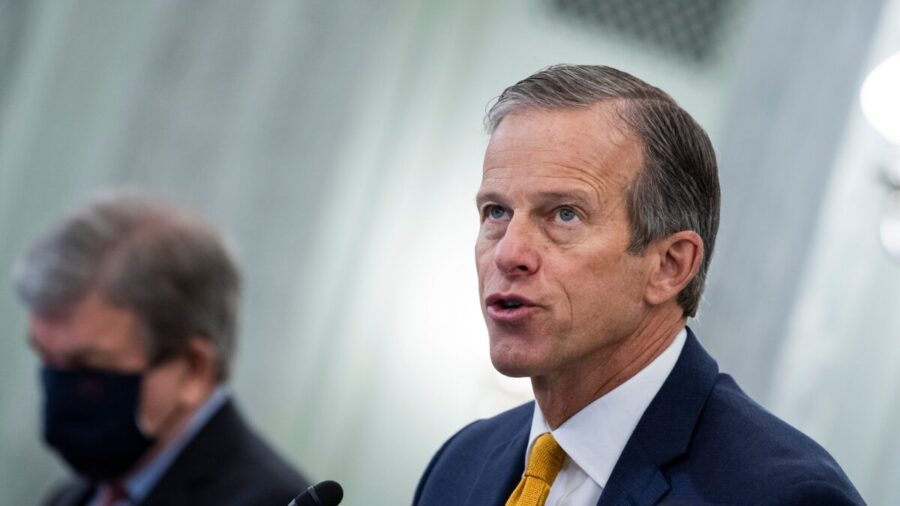Senate Minority Whip John Thune (R-S.D.) signaled on Tuesday that Senate Republicans would leave much of the negotiating on raising the debt limit and imposing budget reforms to their Republican colleagues who hold the majority in the House of Representatives.
In comments to the press, Thune discussed how the Republican Senate minority will handle the party’s agenda in a Congress with split control. While Republicans had held 50 Senate seats before the 2022 midterms, the party faced a net loss of one seat in the November elections, giving Democrats more clear control of the Senate.
After the 2020 election, the Senate was split with 50 Republicans and 48 Democrats and two Independents who caucus with Democrats. In the split Senate, Majority Leader Chuck Schumer (D-N.Y.) had to negotiate on a power-sharing agreement with the Republicans. The power-sharing agreement required Senate committees to be evenly split and forced Democrats to undergo additional procedural votes in order to pass certain legislation.
The loss of a Republican Senate seat in the midterms changes the composition of the Senate committees and allows Democrats to assert greater control over the committees. Thune acknowledged those changes reduce the Republican Party’s power in the Senate and make it a more complicated process to give Republican senators their committee assignment choices.
“There are fewer Republican seats on a few committees, and we have a significant number of new members,” Thune said.
Debt Limit
The United States recently hit its $31.4 trillion debt limit, forcing Congress to come to a vote on if and how they will raise the debt limit. House Speaker Kevin McCarthy (R-Calif.) and House Republicans have called for spending reforms before they will agree to raise the debt ceiling any further.
President Joe Biden has, by contrast, called for Congress to raise the debt limit without conditions. White House press secretary Karine Jean-Pierre said the Republican-controlled House is “trying to hold the debt limit hostage unless they can, again, cut Social Security, cut Medicare, cut Medicaid.”
On Sunday, Senate Minority Leader Mitch McConnell (R-Ky.) told CBS News’ “Face the Nation” that cutting Social Security and Medicare was “off the table.”
Regarding how Republicans plan to handle debt negotiations with changes to Social Security and Medicare off the table, Thune said Republican senators are giving McCarthy and the House Republicans “as much space as possible” to negotiate “what they think is the best deal they can get with the White House.”
While Thune did not oppose McConnell’s call to keep Social Security and Medicare cuts off the table, he did say that the stance would limit what lawmakers could achieve in any potential budget reforms.
“I’ve said before that, you know, we got to deal with the 70 percent of federal spending that’s mandatory,” Thune added. “And that doesn’t mean you have to cut programs. But it does mean that you got to make reforms and spending reforms that will translate into making those programs more sustainable for the long term.”
Thune expressed some hope that the Biden administration would do something to reform Social Security and Medicare because “those programs are both headed for bankruptcy.”
Ending the Pandemic
When asked if Senate Republicans would bring a vote to formally declare an end to the COVID-19 pandemic, Thune again said that the party had more power to make such a move in the House than in the Senate.
Republicans have repeatedly brought measures to formally declare the COVID-19 pandemic era public health emergency over. This month, Republicans in the House introduced two different measures to formally declare an end to the pandemic emergency—one by Rep. Brett Guthrie (R-Ky.) and one by Rep. Paul Gosar (R-Ariz.).
The White House responded to the two Republican bills, stating it plans to keep the pandemic public health emergency declarations going until May 11. The White House argued that the effort of the Republican bills to end the pandemic declaration sooner than May “would create wide-ranging chaos and uncertainty throughout the health care system” and conflict with a Supreme Court case involving the use of pandemic-related restrictions in Title 42 as a justification for turning back migrants arriving at the U.S. border.
Thune noted the White House statement indicating it plans to end the public health emergency in May, saying it’s not clear that Republicans will be able to force a vote on the issue any sooner.
“I mean, it’s imminent, it’s coming,” Thune said. “The question, I suppose is, could you do it sooner? And I think at some point, we all agree that, you know, again, it’s not entirely the case.”
“The House has ball control over there so they can determine when they vote on things. That’s a little harder for us to do,” Thune said.

